ASTM F1717 Spinal Implant Fatigue Bending Testing
The ASTM F1717 test method is an essential procedure used to evaluate the fatigue resistance of spinal implants, particularly those intended for vertebral augmentation. This testing ensures that implants can withstand the stresses encountered during normal use without failure, thereby enhancing patient safety and reliability.
The ASTM F1717 method involves subjecting a spinal implant to repeated bending cycles under controlled conditions. The purpose is to determine how many cycles an implant can undergo before exhibiting signs of fatigue or fracture. This procedure closely simulates the mechanical stresses that occur during everyday activities, such as walking and lifting.
The testing process begins with precise specimen preparation, which involves aligning the implant in a jig designed to mimic spinal anatomy accurately. The jig ensures consistent loading conditions throughout the test cycles. Once prepared, the implant is subjected to a series of bending cycles at specific angles and amplitudes. The frequency of these cycles is determined by the anticipated use and the desired outcome of the testing.
During the testing process, detailed strain measurements are captured using high-precision sensors attached to the specimen. These sensors provide real-time data on how much stress the implant experiences during each cycle. Additionally, displacement and force measurements ensure that every bending event is accurately recorded. This comprehensive data set allows for a thorough analysis of the material properties and structural integrity of the spinal implant.
The acceptance criteria for ASTM F1717 testing are stringent to reflect the critical nature of spinal implants in medical applications. An implant passes the test if it can undergo the specified number of bending cycles without exhibiting any signs of fatigue, such as cracks or fractures. The number of cycles required depends on the specific application and regulatory requirements but is typically much higher than what a patient would experience over their lifetime.
Understanding the role of ASTM F1717 testing in ensuring spinal implant safety and reliability is crucial for quality managers, compliance officers, R&D engineers, and procurement specialists. This method provides invaluable insights into how well an implant can withstand the mechanical stresses it will encounter during use, helping to prevent potential failures that could lead to serious complications.
By adhering to ASTM F1717 standards, manufacturers ensure their products meet rigorous quality control benchmarks, which is essential for gaining market approval and trust from healthcare professionals. The results of these tests are critical in demonstrating compliance with regulatory requirements set by organizations like the FDA and other global bodies.
The importance of ASTM F1717 testing cannot be overstated, as it plays a pivotal role in advancing spinal implant technology. By incorporating this method into their quality assurance protocols, medical device manufacturers can significantly enhance the safety and effectiveness of their products, ultimately contributing to better patient outcomes.
Eurolab Advantages
At Eurolab, we pride ourselves on providing cutting-edge testing solutions that meet the highest standards in the industry. For ASTM F1717 Spinal Implant Fatigue Bending Testing, our expertise and state-of-the-art facilities ensure unparalleled accuracy and reliability.
- Accurate Specimen Preparation: Our skilled technicians prepare specimens with precision, ensuring that each implant is aligned correctly in the jig for consistent loading conditions.
- Precision Instrumentation: We utilize high-precision sensors to capture detailed strain, displacement, and force data during testing. This level of detail provides comprehensive insights into the mechanical behavior of spinal implants.
- Comprehensive Data Analysis: Our team of experienced engineers and scientists analyze test results in depth, providing valuable feedback on material properties and structural integrity.
- Regulatory Compliance: Eurolab adheres strictly to international standards such as ASTM F1717, ensuring that all tests are conducted according to the latest guidelines. This guarantees that our clients receive reports that meet regulatory requirements for market approval.
Our commitment to excellence and customer satisfaction sets us apart in the medical device testing sector. By leveraging our expertise and resources, we help ensure that spinal implants meet the highest quality standards, enhancing patient safety and reliability.
Customer Impact and Satisfaction
- Enhanced Product Quality: By undergoing ASTM F1717 testing at Eurolab, manufacturers can ensure their spinal implants are robust enough to withstand the mechanical stresses encountered during use. This leads to higher product quality and customer satisfaction.
- Increased Market Confidence: Compliance with rigorous testing standards like ASTM F1717 enhances market confidence in a manufacturer's products, leading to increased trust among healthcare professionals and consumers.
- Improved Patient Outcomes: Ensuring that spinal implants are reliable through thorough testing helps prevent potential failures, which can lead to better patient outcomes and improved quality of life.
- Compliance with Regulatory Requirements: By adhering to ASTM F1717 standards, manufacturers can meet regulatory requirements for market approval, ensuring that their products are safe and effective for use.
Our clients have consistently reported high levels of satisfaction with the results of ASTM F1717 testing at Eurolab. The detailed insights provided by our comprehensive data analysis help them make informed decisions about product development and quality assurance.
Environmental and Sustainability Contributions
In addition to enhancing product reliability, ASTM F1717 testing plays a role in environmental sustainability by promoting the development of durable medical devices. By ensuring that spinal implants are robust enough to withstand mechanical stresses, these tests contribute to reducing waste from premature failures.
The durability and longevity of implanted devices can also lead to reduced healthcare costs associated with reoperations due to device failure. This not only benefits patients but also contributes positively to the overall sustainability goals of healthcare systems.
At Eurolab, we are committed to promoting sustainable practices across all our services. By helping manufacturers develop reliable and durable spinal implants through ASTM F1717 testing, we contribute to a more efficient and effective medical device industry.





